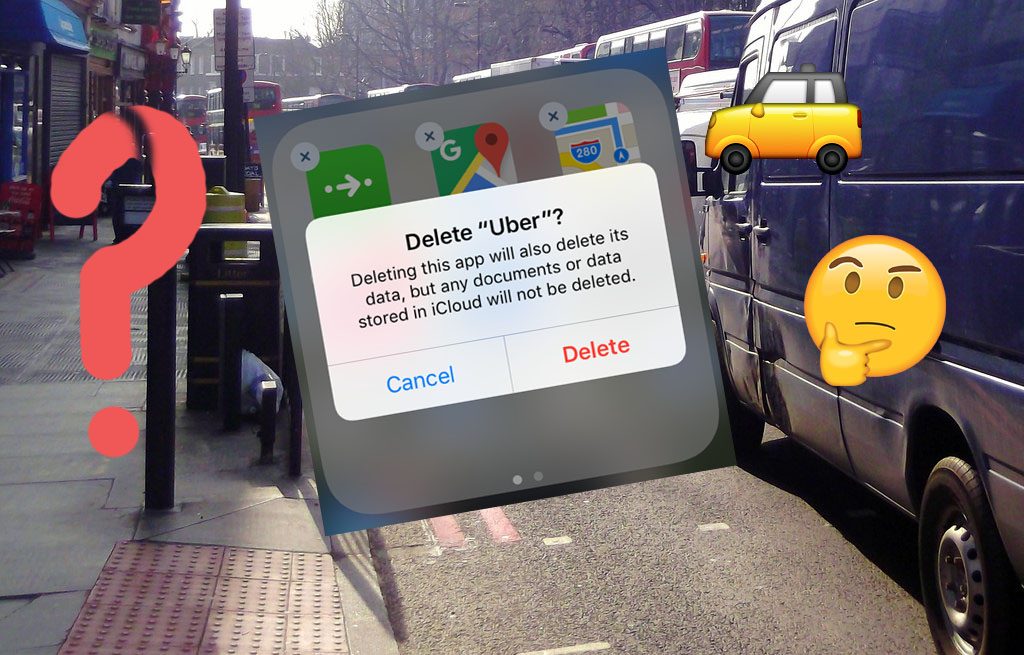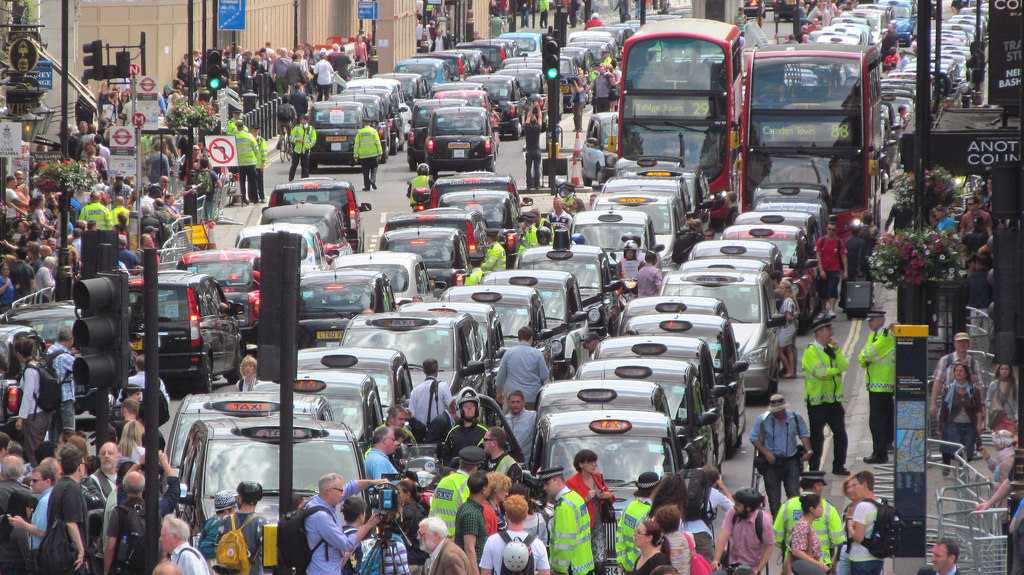
Bans, bro culture, boycotts – what’s going on with Uber?
On September 22nd, Londoners got a big shock. Uber, a car service that 3.5 million of them use (and 40,000 of them work for), could be no more.
The city’s transport authority, Transport for London, decided not to renew their license on the grounds of various accusations to do with customer safety and following government regulations. Uber started a petition to reverse the decision, which 700,000 people signed, and promised it would appeal.
This isn't the first time Uber's got into trouble...
Except it kind of wasn’t that surprising. Uber’s problems over the past few months have gone from bad to worse – there were boycotts, there was that time a senior engineer wrote a viral blog about just how bad a company it is to work for, there was the time the CEO was caught on camera, laying into a driver who asked him why fares were going down... things have not been going smoothly.
On top of all that, Uber’s currently in the middle of a long legal battle about whether the drivers work for themselves, or for Uber – a decision which could force the company to rethink its entire business model.
“Transport for London has made it really clear that their decision had nothing to do with workers’ rights, and everything to do with passenger safety ”
This ban is about even more than worker’s rights. It’s about customer safety, and corporate responsibility, and lots of other serious sounding terms like that… so we’re looking into the whole thing in a bit more detail, and what this scandal means for the other companies like Uber who are changing the way business work.
Brhmie Balaram from the Royal Society of Arts – who is a researcher specifically on Uber and companies like it, told us a bit more:
The Metropolitan Police found Uber had failed to report some pretty serious crimes to the police, which raises concerns that Uber is more worried about the damage to its reputation of being associated with crime than the welfare of the victims and the rest of its passengers.
The whole thing is a perfect example of some of the biggest challenges we're facing in our economies at the moment: how much ( is heplful, and how much is harmful; how to manage competition between old-timers (cabbies) and newbies (Ubers); the effect of technology on how everything works; and how much responsibility and power consumers have to make choices about what kinds of companies they do or don't want to support.
The cabbie vs Uber driver standoff

These big new tech companies cause some major headaches for governments. Including the fact that all the people who work for firms that do the same thing the new company does, but less efficiently, often expect governments to step in and help protect their jobs. In the case of Uber, we're talking Uber drivers vs. traditional taxi drivers.
Now, there are a lot of reasons why cab drivers hate Uber drivers. They create more competition for customers, they charge a lot less than a cab driver ever could and in a lot of places around the world they’ve managed to skirt the pretty stringent rules that other drivers have to abide by to be allowed on the road in the first place.
Economists call these rules a ‘barrier to entry’, which is basically an artificially engineered hoop you have to jump through to do something. In this case, they exist to limit the amount of people who can have cabs on the road. In London, you have to do an insanely difficult test, in NYC and Milan you have to buy a really expensive license (or medallion). It’s basically asking you to make an investment of time, effort and money into something that will pay off once you get access into that lucrative, exclusive taxi club.
Except suddenly that club isn’t that exclusive anymore and those investments aren’t as valuable. Here’s how much the value of medallion has fallen since Uber’s have been on the road:
Cab drivers are a often a single-issue voting group, so politicians like to keep them on their side because if they do, it's pretty certain they'll have their support in the next election. Uber drivers, not so much: they tend to be people in the job for a few years, with other things on their mind. Some are in unions, though the laws around whether they're allowed to be vary around the world.
In Uber’s petition against the loss of its license in London, it framed itself as the defender of Uber drivers' rights, saying they're keeping 40,000 people in work. But Uber is currently being sued by its drivers around the world for low wages and a lack of rights. Plus, lots of Uber drivers have other jobs on the side.
Then there’s how the company treats its other employees
When we think of Uber employees, we're generally thinking of the drivers – but obviously there's a massive Uber HQ staff too, with its own (pretty controversial) . There’d been mumblings about a pretty uneasy working culture at Uber's head office, including rumours about some off-the-wall behavior by the company’s then-CEO Travis Kalanick.
Earlier this year a female engineer at Uber published a pretty damning blog post (which then went viral) detailing not only sexual harassment by a manager – but also that when she tried to report it, she’d been ignored and encourage to shut up.
That blog post was one of the main reasons behind the publication of a major report into Uber’s bro-culture. The report encouraged changes like (I kid you not) changing the name of a meeting room from the ‘war room’ to something a little less aggressive, and taking "always be hustlin'" out of the official company policy. 20 executives were fired, the CEO took a leave of absence (and then left).
All this matters to the larger 'can-companies-like-Uber' survive question. It shows how even firms that seem as slick and modern as Uber from the customer-facing side – our only interaction with the company is through our phone app – aren't immune from the issues of office politics. And when we support the company with our 'economic power' – i.e., by using their service – we're kind of saying we're okay with what we know about how it works on the inside.
Do customers care?
Back in January, some Uber users decided enough was enough.
The last straw was the immigration ban surge pricing scandal. New York taxi drivers were on strike in opposition to Donald Trump's immigrant ban... which obviously meant there was higher demand for Ubers. Uber cars stayed on the road, which to some, looked like they were intentionally profiting off the strike and off Trump’s policy. This coincided with the news that Uber’s CEO Travis Kalanick, would sit on one of Trump’s committees. And thus, #deleteUber was born.
“I just thought ‘you know what, it’s my money. I’ll spend it where I want to spend it.’ ”
For a lot of people, Trump’s election was pretty raw. The #GrabYourWallet campaign was their attempt to use 'consumer power' to protest his politics by not buying from any business that associated with him.
#DeleteUber I've deleted my account due to Uber CEO's accepting position on Trump's advisory council and strikebreaking at JFK on Saturday!
— Kathryn Birstein (@kbirstein) January 31, 2017
Most of these protests blew over, but #deleteUber morphed into #boycottUber, resurfacing every now and again – after the London Bridge terror attacks, Uber’s prices went up along with the demand for cabs people tried to get out of the area and get home (what’s called surge pricing). Straight after, the use of #boycottUber soared.
...But do people really boycott a company when they say they will? Consumer power can only go so far, and at some point, it’s hard not to feel like convenience > principle.
But some people stuck to it. Kerry, one #boycottUber user we spoke to on Twitter, initially decided to delete the app because she was annoyed with their service, rather than any concern about the way the company did business. “I just thought ‘you know what, it’s my money. I’ll spend it where I want to spend it.’”
For others, it's a matter of principle: Lizzy, who we spoke to after she used #boycottuber, said the company’s attitude to women, and its treatment of employees, were her red line.
But she also said that her boycott’s not absolute – “I’ve used it a couple of times since then in cases of emergencies. Like say for example I’m in a country I don’t know and I don’t have any other taxi information and it’s a last resort. I choose not to use it like 99.9% of the time.
According to a YouGov poll, one in five people have boycotted a consumer brand before... but one in four went back to it pretty soon after. It's partly because of the whole convenience-wins-out thing, but it's also the fact that sometimes, an individual boycott can feel totally powerless – a sense that our own custom won't make enough difference to the profits of a massive multinational to make it worthwhile.
What happens next?
There are alternatives to Uber, and even Lizzie admits she could probably do better to research them. But is there an alternative to that power-hungry, bro-driven, global company painted in the report into company culture? Or is that our new normal?
London’s mayor is doing his best to make sure it doesn’t become the new normal. By withdrawing Uber’s license TfL is making a stand against what it sees as unacceptable behaviour. Uber immediately apologised and agreed to talks. The license officially came to an end on 30 September but Uber can continue operating until it runs out of chances to appeal.
The never-ending debate on stuff like this is about finding a balance between making sure companies follow the rules, and not making so many rules that companies can’t do their thing – especially when ‘their thing’ involves keeping 40,000 people in work.
Neal Gorenflo, who co-founded an an organization called Shareable, argues that our only solution is to create new companies that fulfill our desire for convenience and cheap cabs, but that are run by the . If the drivers ran Uber, then Uber wouldn't actually need to exist. And by removing the need for companies like Uber to exist, we remove the chance that they break the rules to support their own massive growth.
Navigating this tech-meets-government world is pretty uncharted territory for economists and politicians, which is probably why it’s in the headlines so much – and Uber is the guinea pig in a much bigger question about who really runs the show in the ‘gig economy’.



